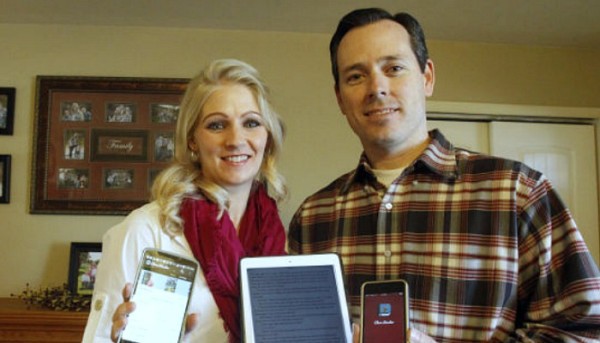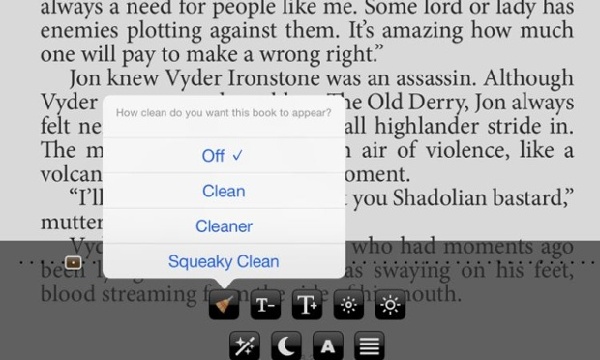當(dāng)前位置: Language Tips> 雙語(yǔ)新聞
Clean Reader: The app that censors rude words from ebooks
分享到

According to a new Android and iOS e-reader app, the definition of "strong language" is somewhat broad. Clean Reader, developed by husband and wife team Jared and Kirsten Maughan after their teenage daughter expressed dismay over some cuss words in a book she read, is designed to keep users who hate naughty words from having to see them. Its tag line: "Read books, not profanity."
新研發(fā)出的一款同時(shí)適用于Android和iOS系統(tǒng)的電子閱讀應(yīng)用程序?qū)Α懊胺刚Z(yǔ)言”的定義比較寬泛。該應(yīng)用叫Clean Reader是由賈里德和克里斯汀?莫恩夫婦倆研發(fā)的。他們的女兒看書(shū)時(shí)被書(shū)中的臟話困擾,于是他們就設(shè)計(jì)了此應(yīng)用,目的在于讓用戶避免看到那些污穢的詞語(yǔ)。他們的口號(hào):“讀書(shū),不讀污。”
How it works is that you load your ebook into the app via iTunes; you can then select one of three filter levels, from mild censorship to the full monty; and the app does a find-and-replace using a database of offensive words selected by the Maughans, replacing them with "clean" versions.
你可以通過(guò)iTunes將你的電子書(shū)加載到該應(yīng)用程序,然后可以從從適度審查到全部審查的三個(gè)過(guò)濾級(jí)別中選擇一個(gè),該程序運(yùn)用查找和替換功能,借助莫恩事先設(shè)定的一個(gè)”冒犯”詞匯數(shù)據(jù)庫(kù),從文中找出污穢詞匯之后用文明的詞匯來(lái)代替。
For example, body parts in the genital region of women are all turned into "bottom"; the f-bomb becomes "freak"; "breast" becomes "chest", which at least is relatively analogous; "Jesus" becomes "gee" (which is actually a euphemistic corruption of "Jesus"); "Oh my God" becomes "Oh my goodness"; "whore" becomes "hussy"; "bitch" becomes "witch" (which could get somewhat confusing if the book actually discusses dogs).
例如,女性生殖器官相關(guān)的身體部位全被替換為“下部”,f打頭的那個(gè)四字詞被替換為“怪物”(freak),“乳房”替換為“胸部”,至少這樣的替換還算是一個(gè)類別的;“Jesus”替換成了“gee”(這個(gè)詞其實(shí)也是委婉指耶穌的簡(jiǎn)稱形式),“哦,我的上帝(Oh my God)”替換成“哦我的天啊(Oh my goodness)”;“妓女”替換為“輕佻的女子(hussy)”;“婊子”替換為“女巫”(如果這本書(shū)是關(guān)于狗的,這樣的替換會(huì)讓人不解)。

This has the potential for some interesting mishaps; GLBT News, for instance, reports a character named "Dick" being converted to "groin." More importantly, however, authors are incensed that the app changes their work without their consent.
這種替換方式必定會(huì)引發(fā)一些讓人啼笑皆非的笑話,比如,根據(jù)GLBT新聞報(bào)道,有一本書(shū)中名叫“迪克”的角色全部被替換為“腹股溝(groin)”。更嚴(yán)重的是,一些作家因?yàn)榇藨?yīng)用在未經(jīng)他們同意的情況下,替換他們的作品內(nèi)容而感到惱火。
As "Chocolat" author Joanne Harris pointed out on her blog, the issue is not necessarily one of vocabulary, but censorship.
《濃情巧克力》的作者喬安娜·哈里斯在她的博客上指出,這并不只是詞匯的問(wèn)題,而是審查制度的問(wèn)題。
"Most writers think very hard about the kind of language they use. Some of us are well-nigh obsessive about our choice of words -- and those of us who are published in theUSoften have to fight to retain our British spellings and vocabulary," she wrote. "We do this because we care about books. We care about language. And if we use profanity (which sometimes, we do) it is always for a reason."
她在博客中寫(xiě)道,“大部分作家很注重語(yǔ)言風(fēng)格的使用,一些作家對(duì)詞匯的選擇幾乎到了著迷的程度,那些在美國(guó)發(fā)表的作品,我們還得努力爭(zhēng)取保留書(shū)中的英式英語(yǔ)拼寫(xiě)和詞匯。我們這樣做是因?yàn)槲覀冊(cè)诤跷覀兊淖髌罚诤跷覀兪褂玫恼Z(yǔ)言,如果我們使用粗魯?shù)脑~匯(有時(shí)我們會(huì)使用),也是出于我們的特定理由。
Moreover, the censorship imposed by Clean Reader is subjective, based on a good-and-bad value judgement decided by the Maughans -- although the Clean Reader website also does ask readers to suggest words they'd like to see filtered if the app does not already do so.
此外,“清潔讀者”應(yīng)用軟件所做的審查是主觀的,它僅僅基于莫恩設(shè)定的一個(gè)好壞價(jià)值評(píng)判標(biāo)準(zhǔn)——雖然清潔讀者網(wǎng)站希望讀者提交他們希望過(guò)濾但是該應(yīng)用還沒(méi)有過(guò)濾的詞匯。
"It's clear from the list of words you consider 'profane' that this app is designed to impose a Christian agenda on books," Harris wrote in an open letter to Clean Reader. "This is insulting to non-Christians. The pejorative use of the word 'witch' as a substitute for 'bitch' is offensive to pagans, and illustrates your religious bias."
哈里斯在給“清潔讀者”的一封公開(kāi)信中寫(xiě)道,“從你們認(rèn)定為‘不敬’的詞匯列表中明顯能看出此應(yīng)用程序是把基督教的要求強(qiáng)加到了書(shū)籍上。這對(duì)非基督徒是一種冒犯。把witch(女巫)這個(gè)詞用來(lái)替換貶損意味的bitch一詞,這是對(duì)異教徒的冒犯,同時(shí)也表明了你的宗教偏見(jiàn)。”
She also points out that, if the idea is supposed to benefit young readers, it fails dismally; calling every part of a woman's reproductive anatomy a "bottom", for example, could be very confusing to a child, and is therefore counter-productive.
她還指出,如果這個(gè)想法是為了讓年輕讀者受益,那么它敗得很慘。 將女性的所有的生殖器官部分都稱為“底部”, 會(huì)使孩子非常困惑,所以這樣的做法會(huì)適得其反。
The Clean Reader team is adamant, however that the app is not only not doing anything wrong -- it is, they claim, perfectly legal, since they app does not change the epub source file, but merely how it is displayed on the screen -- but that authors who are unhappy with the alteration of their work should defer to anyone who spends money on that book, comparing the app to the optional profanity beeping on NPR podcasts.
然而,清潔讀者團(tuán)隊(duì)則固執(zhí)地認(rèn)為,這個(gè)應(yīng)用程序不僅沒(méi)有做錯(cuò)任何事情——而且是完全合法的,因?yàn)樗麄兊膽?yīng)用不會(huì)改變電子書(shū)的源文件,而僅僅是對(duì)其顯示在屏幕上的樣式做了改變,就跟NPR播客上用嗶嗶聲代替一些不雅詞匯一樣。他們還指出,那些對(duì)改變自己作品不滿意的作家應(yīng)尊重花錢(qián)購(gòu)買(mǎi)自己作品的讀者。
"Some people like the impact certain words have on the narrative, dialogue, or setting of a book. Other people are indifferent to it. And some are offended by it... Yes the author/artist felt specific swear words worked best for their work of art, but for some of their audience these same words are what detract from the book," the Clean Reader team wrote on its blog.
清潔讀者團(tuán)隊(duì)在博客上寫(xiě)道:”有些人喜歡某些詞語(yǔ)對(duì)故事,對(duì)話,或故事背景產(chǎn)生的影響,但其他人并不在意,還有一些人因此受到冒犯……確實(shí)一些作家/藝術(shù)家認(rèn)為特定的臟話可以對(duì)作品產(chǎn)生最好的效果,但對(duì)于他們的一些讀者來(lái)說(shuō),這些詞語(yǔ)會(huì)使作品失色。”
"So will some authors be offended that some of their consumers use Clean Reader to pick out most of the profanity in their books? Perhaps. Should the reader feel bad about it? Nope. They've paid good money for the book, they can consume it how they want."
“所以一些作家會(huì)因?yàn)樽x者購(gòu)買(mǎi)使用“清潔讀者”應(yīng)用把他們作品中大部分粗魯?shù)脑~匯挑出來(lái)而生氣嗎?也許吧,讀者應(yīng)該對(duì)此有愧疚感嗎?不。他們已經(jīng)花錢(qián)購(gòu)買(mǎi)了這本書(shū)籍,他們就可以按自己喜歡的方式使用它。"
The good news for authors is that the money users pay for these ebooks is no longer going to Clean Reader. Inktera, the platform through which Clean Reader was selling ebooks (and making a percentage of sales), has withdrawn from the app.
對(duì)作家們來(lái)說(shuō),好消息是清潔讀者應(yīng)用不會(huì)拿到讀者購(gòu)買(mǎi)電子書(shū)的一分錢(qián),“清潔讀者”用以出售電子書(shū)的Inktera平臺(tái)對(duì)其下架。
Sci-fi author Chuck Wendig also had this to say to readers who would prefer to read a censored version of his work:
科幻作家查克·溫迪科對(duì)那些喜歡讀過(guò)濾版作品的讀者有話說(shuō)。
"You may say, 'But I want to read your books, just without all that nasty business.' To which I say, 'then I don't want you reading my books. Nothing personal, but I wrote the thing the way I wrote the thing. If that troubles you, then I don't want you reading it.'"
“有人可能會(huì)說(shuō),‘我想讀你的作品,但是不想要那些粗俗語(yǔ)言’,對(duì)此我的回答是“那我不想讓你讀我的書(shū)。不是針對(duì)任何人,我只是按我的方式寫(xiě)我的書(shū)。如果你覺(jué)得這樣會(huì)冒犯你,那么我希望你不要讀它。”
Vocabulary
dismay:使驚愕
cuss:粗話
profanity:褻瀆
full monty:一整套
pagan:非基督教徒
adamant:堅(jiān)決的
(翻譯:李楠楠BISTU 編輯:Helen)上一篇 : 嘲弄肥胖人士‘應(yīng)立法禁止’
下一篇 : "剪刀手"在美國(guó)文化中的含義
分享到
關(guān)注和訂閱


口語(yǔ)
關(guān)于我們 | 聯(lián)系方式 | 招聘信息
電話:8610-84883645
傳真:8610-84883500
Email: languagetips@chinadaily.com.cn